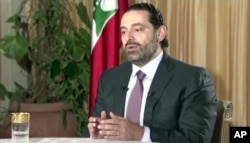Lebanese Prime Minister Saad Hariri said Wednesday he is putting on hold his resignation at the request of President Michel Aoun.
Speaking at the presidential palace near Beirut after a parade marking Lebanon's independence day, Hariri said the delay was meant to give time for more discussion with the president.
"Our beloved nation needs in this critical period exceptional efforts from everyone to protect it in the face of dangers and challenges," he said.
He also reiterated the need for Lebanon to remain neutral on regional conflicts.
Hariri sparked a political crisis earlier this month when he announced from Saudi Arabia that he would step down, and then remained in Saudi Arabia as speculation swirled as to whether he was being detained.
Aoun had said he would not accept the resignation until he could speak with Hariri in person, and after stops in France and Egypt, Hariri arrived back in Lebanon on Tuesday night.
Hezbollah influence
In his resignation speech, Hariri denounced Iran and Hezbollah for sowing friction in Arab states and said he feared assassination. His father, former Prime Minister Rafik Hariri, was killed in a 2005 bombing.
Middle East Institute scholar Zubair Iqbal said the entire situation unfolded because of a disruption in the delicate balance of competing influences over Lebanon, including those of Sunni-majority Saudi Arabia and Shi'ite-majority Iran. He said Aoun had been leaning toward Hezbollah, which "established its credentials" in the conflict in neighboring Syria and elsewhere.
"So the point really is, under these circumstances where the conditions were tilting against Hariri and his group, what was to be done? Now the Saudis clearly overreacted," Iqbal told VOA. "Instead of trying to work out the situation in Lebanon itself they regionalized it, and by regionalizing it they lost all the initiative or all the credentials that is concerned."
VOA's Victor Beattie in Washington DC contributed to this report











